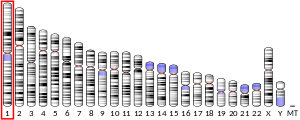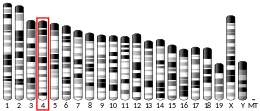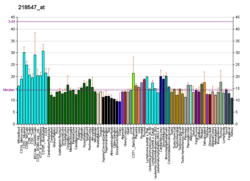Dehydrodolichyl diphosphate synthase
Dehydrodolichyl diphosphate synthase is an enzyme that in humans is encoded by the DHDDS gene.[5][6]
Function
Dehydrodolichyl diphosphate (dedol-PP) synthase catalyzes cis-prenyl chain elongation to produce the polyprenyl backbone of dolichol, a glycosyl carrier lipid required for the biosynthesis of several classes of glycoproteins.[6]
Clinical significance
It has been suggested that missense mutations in the DHDDS gene are responsible for certain variants of retinitis pigmentosa.[7] Since it is involved in the early steps of dolichol synthesis, vital e.g. for correct N-glycosylation, a disease caused by mutations in DHDDS should be considered a congenital disorder of glycosylation (and named DHDDS-CDG according to the novel nomenclature of CDGs).[8] Many CDG subtypes present with retinitis pigmentosa as a major feature.[9]
References
- 1 2 3 GRCh38: Ensembl release 89: ENSG00000117682 - Ensembl, May 2017
- 1 2 3 GRCm38: Ensembl release 89: ENSMUSG00000012117 - Ensembl, May 2017
- ↑ "Human PubMed Reference:".
- ↑ "Mouse PubMed Reference:".
- ↑ Endo S, Zhang YW, Takahashi S, Koyama T (Feb 2003). "Identification of human dehydrodolichyl diphosphate synthase gene". Biochim Biophys Acta. 1625 (3): 291–5. doi:10.1016/S0167-4781(02)00628-0. PMID 12591616.
- 1 2 "Entrez Gene: DHDDS dehydrodolichyl diphosphate synthase".
- ↑ Zelinger L, Banin E, Obolensky A, Mizrahi-Meissonnier L, Beryozkin A, Bandah-Rozenfeld D, Frenkel S, Ben-Yosef T, Merin S, Schwartz SB, Cideciyan AV, Jacobson SG, Sharon D (February 2011). "A missense mutation in DHDDS, encoding dehydrodolichyl diphosphate synthase, is associated with autosomal-recessive retinitis pigmentosa in Ashkenazi Jews". Am. J. Hum. Genet. 88 (2): 207–15. doi:10.1016/j.ajhg.2011.01.002. PMC 3035703. PMID 21295282.
- ↑ Jaeken J, Hennet T, Matthijs G, Freeze HH (September 2009). "CDG nomenclature: time for a change!". Biochim. Biophys. Acta. 1792 (9): 825–6. doi:10.1016/j.bbadis.2009.08.005. PMID 19765534.
- ↑ Freeze HH, Eklund EA, Ng BG, Patterson MC (May 2012). "Neurology of inherited glycosylation disorders". Lancet Neurol. 11 (5): 453–66. doi:10.1016/S1474-4422(12)70040-6. PMC 3625645. PMID 22516080.
Further reading
- Rual JF, Venkatesan K, Hao T, et al. (2005). "Towards a proteome-scale map of the human protein-protein interaction network". Nature. 437 (7062): 1173–8. doi:10.1038/nature04209. PMID 16189514.
- Jones J, Viswanathan K, Krag SS, Betenbaugh MJ (2005). "Polyprenyl lipid synthesis in mammalian cells expressing human cis-prenyl transferase". Biochem. Biophys. Res. Commun. 331 (2): 379–83. doi:10.1016/j.bbrc.2005.03.181. PMID 15850770.
- Gerhard DS, Wagner L, Feingold EA, et al. (2004). "The status, quality, and expansion of the NIH full-length cDNA project: the Mammalian Gene Collection (MGC)". Genome Res. 14 (10B): 2121–7. doi:10.1101/gr.2596504. PMC 528928. PMID 15489334.
- Kharel Y, Takahashi S, Yamashita S, Koyama T (2004). "In vivo interaction between the human dehydrodolichyl diphosphate synthase and the Niemann-Pick C2 protein revealed by a yeast two-hybrid system". Biochem. Biophys. Res. Commun. 318 (1): 198–203. doi:10.1016/j.bbrc.2004.04.007. PMID 15110773.
- Ota T, Suzuki Y, Nishikawa T, et al. (2004). "Complete sequencing and characterization of 21,243 full-length human cDNAs". Nat. Genet. 36 (1): 40–5. doi:10.1038/ng1285. PMID 14702039.
- Shridas P, Rush JS, Waechter CJ (2004). "Identification and characterization of a cDNA encoding a long-chain cis-isoprenyltranferase involved in dolichyl monophosphate biosynthesis in the ER of brain cells". Biochem. Biophys. Res. Commun. 312 (4): 1349–56. doi:10.1016/j.bbrc.2003.11.065. PMID 14652022.
- Strausberg RL, Feingold EA, Grouse LH, et al. (2003). "Generation and initial analysis of more than 15,000 full-length human and mouse cDNA sequences". Proc. Natl. Acad. Sci. U.S.A. 99 (26): 16899–903. doi:10.1073/pnas.242603899. PMC 139241. PMID 12477932.




